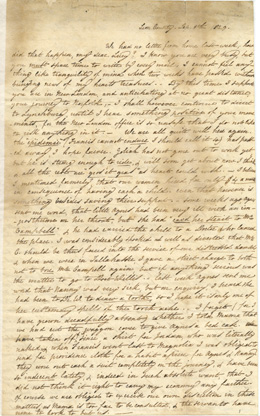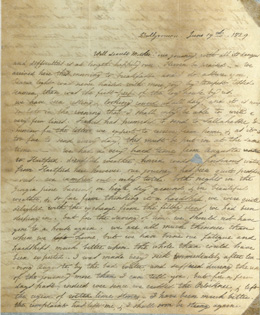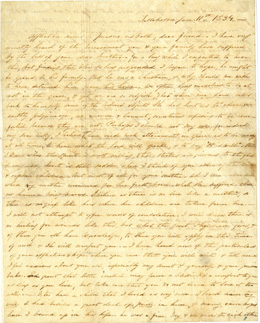Pestilence, Potions, and Persistence Early Florida Medicine
Healthy Climes and Killer Swamps
Since its earliest years as a colony and U.S. territory, Florida has represented a place for new beginnings. With abundant farm land, a long growing season, and plenty of sunshine and rain, Florida soon attracted farmers and land owners from the American colonies, and later, states to the north searching for new economic opportunities.
Letter to Mrs. Thomas Eston Randolph, from Her Sister, Harriet
In a letter to her sister who is still preparing for the move, Harriet tells her about where they have moved, plans for the house and school, and their neighbors.
The letter describes the process of establishing a household in Leon County, finishing construction, and planning for the garden. The place for the homestead was chosen by the Randolphs because it was “remarkably high and dry, & giving the promise, from its appearance of being very healthy.”
The letter, while recounting the state of mind of family members, shows the settlers' preoccupation with health concerns and the impact that poor health development would have on the family’s prospects.
Near the end, Harriet reminds her sister to pray for her rheumatism, which had “crippled” her over the summer. The condition severely limited the use of her right arm and one leg, and caused great pain. But, she believed that the legends of the healthful Florida climate had been fully realized in her case, stating, “it is a pleasure simply to breathe such an atmosphere.”
Prosperity and Catastrophe
For those early settlers, Florida’s climate, swaths of rich soil, thick forests, and abundant water offered the promise of health and prosperity, even while the wildness of the land, months of heat, seeming susceptibility to tropical disease, and potential for catastrophic weather proved daunting challenges to be overcome.
L.B. Randolph Letter to His Mother, Mrs. Thomas Eston Randolph
In a letter to his mother still in Lynchburg, Virginia, L.B. Randolph described the hardships of the road to north Florida. He became sick from “poisonous water” in Augusta, Georgia, and was ill for days afterwards as the family traveled farther south.
He described the relief of crossing the land of “rotten lime stone,” passing the Ochlocknee River, and reaching drier land with better water.
Once they arrived, he was heartened by the beautiful landscape, particularly the moss-draped oaks and the placement of the “log pen” house near a hammock.
After the arduous journey was completed, he, the rest of the family, and the servants were all improving in health.
L.B. Randolph Letter to His Friend, Miss Susan I. Harrison
In writing to his friend Miss Susan I. Harrison, L.B. Randolph expressed condolences for the loss of her brother and related his own sadness at the death of his young son who was “smitten with disease.”
The letter makes vivid the specter of sudden death that hung over the lives of these 19th-century Americans due to uncertainty about health and safety. It also illustrates the writer’s belief in the importance of relying on the “great Physician” to heal emotional wounds.
He believed his son had been taken by yellow fever, which had apparently struck slave families in their area before overtaking every member of his household over the course of several months.
His elderly father was affected by severe fever and chills the following summer.

 Listen: The Blues Program
Listen: The Blues Program


